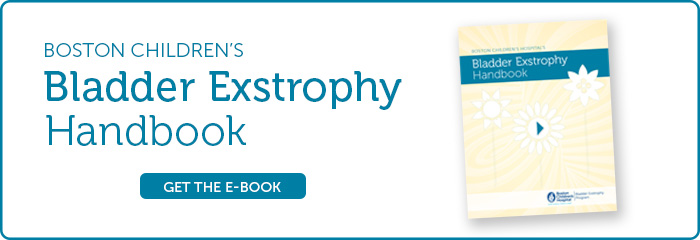Breadcrumb
- Home
- Programs & Services
- Bladder Exstrophy Program
The Bladder Exstrophy Program at Boston Children’s Hospital provides expert, specialized care for children with bladder exstrophy, epispadias, and cloacal exstrophy.
As an established and dedicated program within the Department of Urology, we have decades of experience performing surgeries and managing the care of patients with bladder exstrophy, epispadias, and cloacal exstrophy. We are a destination for patients and families of children with bladder exstrophy from across the country and around the world.
Our program is one of the largest and most experienced bladder exstrophy programs in the country. We are advancing surgical care as one of the first centers in North America that offers the Kelly procedure. We are committed to continuous improvement and patient-centered care, having been part of a multi-institutional collaboration (MIBEC) since 2013. This dedication keeps us at the forefront of medical innovation while always putting the well-being of every child first.
Where our patients come from
Our approach to bladder exstrophy
In the Bladder Exstrophy Program, we take a whole-family, team-based approach to care. While the program is led by experienced urologists, we draw on the expertise of specialists from a wide range of disciplines, including anesthesiology, orthopedics, physical therapy, and radiology. Our care team also includes dedicated social workers, psychologists, specialized nurses, and advanced practice clinicians (such as nurse practitioners, physician assistants, and clinical nurse specialists) who play a crucial role in delivering comprehensive treatment and long-term support.
We work closely with our colleagues across Boston Children’s Hospital to ensure that each child receives the highest level of coordinated care. This includes collaboration with the Colorectal and Pelvic Malformation Center, Urodynamics Program, and Fetal Care and Surgery Center. Together, we create a personalized care plan that takes your child’s individual needs, as well as your family’s needs, into account.
Initial surgery
Surgical reconstruction of bladder exstrophy is the most critical step in your child’s care. There are varied approaches for both technique and timing for this initial surgery. We offer complete primary repair of bladder exstrophy with the Kelly procedure in boys and girls. This operation is performed in a single stage procedure, meaning that bladder closure, urethral repair, and genital reconstruction are all done during one surgery. This approach helps reduce the number of operations your child needs and supports early healing and development. Surgery typically takes place eight to 12 weeks after birth, giving your baby time to grow, develop, and bond with you.
After the procedure, we closely monitor your child’s growth, development, and overall health, with special attention to bladder and kidney function.
Incontinence
Children with bladder exstrophy often continue to have some urine leakage even after their first surgery. We take a personalized approach to managing this, carefully considering your child’s unique anatomy, emotional and social needs, and how much the leakage is affecting their daily life.
Many children begin to have longer dry periods during adolescence, but some choose to have additional surgery to help them stay dry more consistently. For certain patients, we may recommend a procedure called bladder neck reconstruction, which can help extend dry times while still allowing your child to urinate on their own — without needing to use a catheter.
Genital appearance and function
Children — especially boys — with bladder exstrophy can have a wide range of feelings about how their genitals look and function. Some boys may have issues like penile curvature, shorter penile length, or limited skin coverage, which can sometimes be improved with additional surgery.
For certain patients, we may offer a procedure called a redo Kelly repair to help improve both the appearance and function of the genitals.
Psychosocial support
Our approach to bladder exstrophy care extends well beyond surgery. We believe psychosocial and emotional support are crucial as you and your child cope with the challenges of this condition. That’s why our Bladder Exstrophy Program team includes a dedicated social worker and a psychologist who will partner with you and your family every step of the way to ensure your child’s needs are met. These needs may include care coordination, coping, orientation with hospital services, support groups, identification of community programs, or support with school transitions. We work closely with other Boston Children’s programs including the Hale Family Center for Families, Child Life Services, Department of Spiritual Care (chaplaincy), and Child Psychiatry and Case Management.
Our integrated, patient-centered approach ensures that families are supported every step of the way, and that each child’s unique needs are met with the highest level of care and expertise.
Our areas of research and innovation
We are constantly striving to learn more about the underpinnings of bladder exstrophy, epispadias, and cloacal exstrophy — and to enhance treatment. Our areas of research focus include genetics and genomics, improvements in post-operative care, refinements in surgical care, and more.
Patient resources
Our Exstrophy Support Group meets twice a year for a half day and offers patients and their families an opportunity to meet and learn from one another. A typical group may include a presentation, a patient or family panel, and break-out sessions, while children have their own program. In addition, our Family-to-Family Program is available to introduce new patients and their families to experienced family partners.


